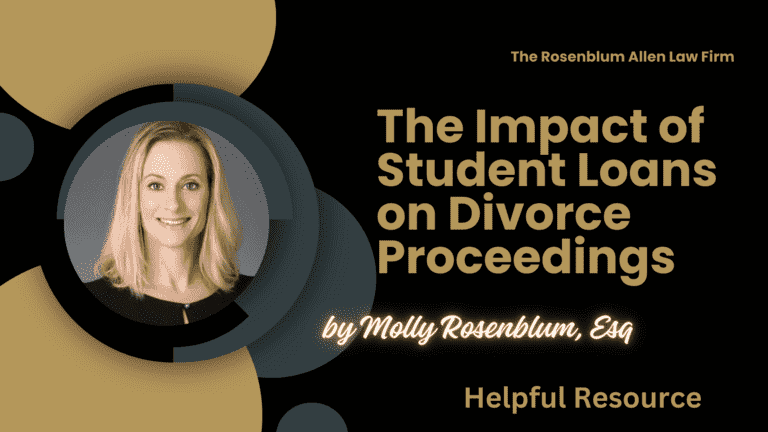How Student Loans Can Affect Your Divorce in Nevada
When two people decide to get a divorce, they have to figure out how to split up everything they own and owe.
In Las Vegas and all over Nevada, student loans can be tricky to split.
If you or your spouse took out student loans while married, what happens to that debt when you divorce?
Let’s talk about it!

What Happens to Student Loans in a Divorce?
In Nevada, the money you owe on student loans can be treated differently when you get divorced. It depends on when you got the loans and what they were used for.
If You Got Loans Before Marriage
If you took out student loans before marriage, that debt is usually yours to keep after the divorce. It’s considered separate property, which means it belongs to the person who got the loans.
If You Got Loans During Marriage
If you got the student loans while you were married, it might be different.
In Nevada, debts taken on during marriage are often seen as “community debt.”
This means both people might be responsible for paying them back.
However, there are some exceptions, like if the loans were for one person’s education and didn’t help the other.
What About Helping Pay the Loans?
Sometimes, one spouse might have helped to pay the student loans with their own money or by working. This can make things a bit more complicated. The court might look at how much the non-student spouse helped and decide that the student loans should be shared more fairly.
Can We Decide on Our Own?
Yes! The best thing is if both people in the divorce can agree on what to do with the student loans. This can be done with the help of lawyers like us at The Rosenblum Allen Law Firm, who understand how to ensure the agreement is fair and follows Nevada laws.

Considering the Type of Loan
Federal vs. Private Student Loans:
- Federal student loans are typically in the name of the individual who attended school. Even if these loans were taken out during the marriage, it doesn’t automatically mean they will be divided between both parties.
- Private student loans can be more complicated, especially if both spouses co-signed for the loan. This may create joint responsibility.
The Role of Prenuptial Agreements
If there was a prenuptial agreement, it might have specific terms about handling debt, including student loans, in the event of a divorce. This can simplify matters, as the agreement may clearly state whether student loan or marital debt is separate.
Contributions to the Marriage
The court will also consider how the education funded by the loans benefited the marriage. For example:
- Suppose the degree earned with the student loans significantly increased the borrower’s earning potential, and the family benefited from this income during the marriage. The court might see the debt as a shared responsibility in that case.
- Conversely, suppose the degree didn’t substantially benefit the marriage or the couple separated soon after completion. In that case, the court may decide that the debt belongs solely to the person who took out the loans.

Division of Debt and Assets
Nevada is a community property state, meaning any debt or assets acquired during the marriage are generally divided equally. However, there can be exceptions, and student loans can sometimes be one of these exceptions due to the factors mentioned earlier.
Student Loan Payments Made During Marriage
If marital funds were used to pay down one spouse’s student loan debt, the other spouse might be entitled to compensation or a more favorable division of other marital assets.
Negotiating an Agreement
Couples have the option to negotiate an agreement outside of court. They may agree to assign the student loan debt to the spouse who benefited from the education or to split it in a mutually agreeable way. If they can’t agree, a judge will decide based on Nevada law and the case’s specifics.
Future Implications
The outcome of how student loan debt is divided can have long-term financial implications for both parties. It can affect credit scores, future borrowing ability, and financial stability.
Getting Legal Assistance
Given the complexities of dealing with student loan debt in a divorce, seeking legal counsel is wise. A lawyer can provide guidance tailored to your situation, assist in negotiations, and ensure that any agreement is equitable and complies with Nevada law. They can also represent your interests in court if an agreement cannot be reached.

Breaking It All Down for You
Divorce can be challenging, and student loans often add to that complexity.
Understanding your rights and responsibilities when dividing this debt is crucial.
Whether through negotiation or court proceedings, the goal is to reach a fair and legal resolution that allows both parties to move forward with their lives.

Frequently Asked Questions
Can student loan debt be considered separate property in a Nevada divorce?
Yes, if the student loans were taken out before the marriage, they’re typically considered separate property and remain the responsibility of the individual who incurred the debt.
If I supported my spouse through school, do I have any claim to their future earnings after divorce?
While future earnings are generally not divided in a divorce, if you financially supported your spouse’s education, you might be entitled to reimbursement or a more favorable division of other marital assets.
Do I have to share the debt if my name is not on the student loan?
If the student loans were acquired during the marriage and are considered community debt, you may still be responsible for repayment, regardless of whether your name is on the loan. However, various factors can influence this determination.
What if my spouse’s degree did not improve our financial situation during the marriage?
If the degree did not substantially benefit the marriage or the couple divorced shortly after its completion, the court may assign the student loan debt solely to the individual who obtained the loans.
How can a prenuptial agreement affect student loan debt in a divorce?
A prenuptial agreement may outline specific terms regarding the handling of student loan debt in the event of a divorce, potentially overriding default community property rules.
How does co-signing a student loan affect divorce proceedings?
Co-signing a student loan can create joint responsibility for the debt, even if only one spouse benefited from the education. Both parties might be legally liable for repayment.
Can the division of student loan debt be modified after the divorce is finalized?
Modifications to the division of debt post-divorce are uncommon and typically require significant changes in circumstances. It’s crucial to ensure that student loan debt is accurately addressed in the divorce decree.
What happens if we can’t agree on handling our student loan debt?
If you and your spouse cannot reach an agreement, a judge will decide based on relevant factors under Nevada law, including when the debt was incurred and its impact on the marriage.
What happens to the student loan debt if my spouse passes away?
If the student loan is solely in your spouse’s name, you generally wouldn’t be responsible for the debt. Federal student loans are discharged upon the borrower’s death, but obligations on private loans may vary.
How can I protect myself from my spouse’s student loan debt in a divorce?
Seek legal advice from a divorce attorney to understand your rights and negotiate a fair settlement regarding the division of all debts and assets, including student loans.

Additional Resources for You
We’d like to remind our readers that our esteemed lead attorney, Molly Rosenblum Allen, Esq., has meticulously developed a variety of resources to assist you during challenging times. These resources are designed to offer guidance and answer your critical questions:
Las Vegas Divorce Attorney: Expert advice and legal support for navigating divorce in Las Vegas. Explore Here
Alimony in Nevada: Understand the specifics of alimony laws and expectations within the state of Nevada. Learn More
Divorce and Mortgage: Insights on handling your mortgage obligations and options during a divorce. Read Further
Divorce and Taxes: Essential information on how divorce can impact your tax situation and planning. Get Informed
Health Insurance After Divorce: Guidance on managing health insurance changes post-divorce. Understand Your Options
Divorce and Bankruptcy: Navigating the complex intersection of divorce proceedings and bankruptcy. Learn the Implications
How Much is Alimony in Nevada?: Get a clearer understanding of what to expect regarding alimony amounts in Nevada. Estimate Your Alimony
Divorce Attorney Fee: Insight into the costs associated with hiring a divorce attorney and how fees are structured. Plan Financially
Who Gets the House in a Divorce in Nevada: Legal perspectives on property division, specifically focusing on the marital home in Nevada. Know Your Rights
How to Not Get Screwed in a Divorce: Strategic advice to protect your rights and assets during divorce proceedings. Protect Yourself
We encourage our readers to utilize these resources thoughtfully crafted by Molly Rosenblum Allen, Esq., to navigate the complexities of divorce with confidence and clarity.

Offsite Resources You May Find Helpful
Here are seven offsite resources with valuable information. These homepages link to organizations and services that can provide further assistance:
Divorce Source: A comprehensive resource for state-specific divorce information, including forums and legal products.
International Academy of Family Lawyers: An association of lawyers recognized by their peers as the most experienced and skilled family law specialists in their respective countries.
Legal Information Institute at Cornell Law School: Cornell’s LII offers broad legal resources, including access to family law statutes and legal information.
Psychology Today – Divorce: While not a purely legal resource, Psychology Today offers insights into the psychological aspects of divorce and can help you navigate the emotional challenges.
National Parenting Organization: This site focuses on promoting shared parenting and offers resources and research to support families going through divorce.
These resources can provide comprehensive support, from legal advice to emotional guidance, to help readers manage the multifaceted challenges of divorce

A Special Message From Our Lead Attorney

Molly Rosenblum, Esq
Dear Reader,
Thank you for taking the time to explore our divorce resources.
I hope the information provided has been informative and helpful to you during what I understand can be challenging and complex.
Please reach out if you feel ready to take the next step and would like personalized guidance tailored to your unique situation.
Call me and my team at (702) 433-2889. We’re here to listen, understand your circumstances, and work with you to get the ball rolling toward a resolution that supports your best interests.
Warm regards,
Molly Rosenblum, Esq.
The Rosenblum Allen Law Firm



